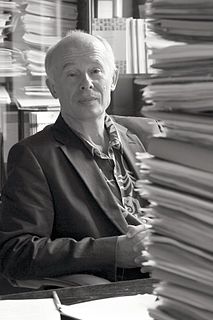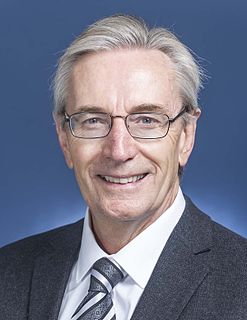A Quote by Naomi Oreskes
Most people have thought of ... climate change as a problem about the environment that is separate and distinct from problems of human wellbeing.
Related Quotes
Climate change is not about climate change. It's about the people in it getting rich off of an ever-expanding, growing, controlling government. It's all about expanding the government and government control over people. It's about creating victims. When you successfully turn somebody into a victim, you have automatically made them a dependent on you. You are essentially telling them they have lost the power necessary to solve their own problems. And you create within them a mentality that they can't overcome their own problem because they're victims.
I think that we Americans, in particular, tend to think too directly about problems. If there's a problem we want to basically go in with a screwdriver or else drop bombs on it. A better way to solve problems is to think indirectly and try to change the environment. So I think you can gain much better self-control not so much by working on yourself as by looking at the situations you're in and the people you hang around, and changing your environment.
Actually, climate change is really about the wellbeing of people. It is not a very vague concept or a vague problem that is out of our everyday lives. It is actually affecting our everyday lives, and this is the fundamental fact that everybody should keep in mind while working toward a low-carbon society.
Tackling the issue of climate change presents us with an inflection point in human history - a climate justice revolution that separates development from fossil fuels, supports people in the most vulnerable situations to adapt, allows all people to take part, and, most importantly, realise their full potential.
Most people define learning too narrowly as mere 'problem-solving', so they focus on identifying and correcting errors in the external environment. Solving problems is important. But if learning is to persist, managers and employees must also look inward. The need to reflect critically on their own behaviour, identify the ways they often inadvertently contribute to the organisation’s problems, and then change how they act.
... as we are being blunt, the fact is that Tony [Abbott] and the people who put him in his job do not want to do anything about climate change. They do not believe in human caused global warming. As Tony observed on one occasion "climate change is crap" or if you consider his mentor, Senator Minchin, the world is not warming, its cooling and the climate change issue is part of a vast left wing conspiracy to deindustrialise the world.
By isolating the issues of race, gender, sexual orientation, climate change, environment, governance, economics, catastrophe and whatever other problems the present embodies or the future may bring, science fiction can do what Dickens and Sinclair did: make real the consequences of social injustice or human folly.
...the world needs to face up to the challenge of climate change, and to do so now. It is clear that climate change poses an urgent challenge, not only a challenge that threatens the environment but also international peace and security, prosperity and development. And as the Stern report showed, the economic effects of climate change on this scale cannot be ignored, but the costs can be limited if we act early
Climate change is not a discrete issue; it's a symptom of larger problems. Fundamentally, our society as currently designed has no future. We're chewing up the planet so fast, in so many different ways, that we could solve the climate problem tomorrow and still find that environmental collapse is imminent.
It's very hard to track down what's real and what's not real. We haven't absorbed what climate change is doing. Because whether people associate it or not, fear of immigration is completely related to climate change, because the mass migrations that are happening, the war in Syria, all of these structural human migrations are related to climate change.








































